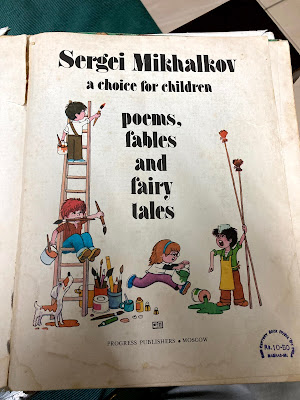From Each
This post got me - rather tangentially - thinking of a poem by the Soviet children's poet Sergei Mikhalkov. You're going to have to read a bunch of irrelevant ramblings before you can read the poem at the end of the post.
The book is slightly older than me. A hand-me down from a family friend. Preserved atypically carefully by me to hand-down.
The 'tone' of the poems and stories from the Soviet stand out so distinctly. They are fun without being didactic. But they are consciously infusing a certain 'spirit' that runs through as a theme. In some ways that feels more 'complete' than the (understandable) Indian anxiety to ensconce in a tradition or devolve(!) to absurd fun.
I was conversing with a cousin of mine a few days back about just how much Indian childhood, of a certain kind, was infused with so much knowledge of Soviet.
I used to get the Soviet children's monthly MISHA by book-post . There used to even be section where the same crossword was in English and Russian Cyrillic. To know how the equivalent word looks without knowing even how to pronounce it was a child's version of Rosetta Stone!
So, when I hear that the science-types, had access to quality textbooks from Russia @ affordable prices, I am least surprised.
Of course we are intimately familiar with Russian literature more than any other world literature. For some reason that doesn't seem to have been the case with films. Of course the artsy types see their Tarkovsky. But we don't seem to know the pop-films as well. In the early oughties I've watched 'Ballad of a Soldier' and Kalatazov's 'Cranes are Flying' in the Russian Cultural Centre.
I've been on a Soviet film-trip lately (On Mosfilm's free youtube channel. Hail Socialism!). I should probably blog about a couple of them some time.
Anyway, now to the poem.
The Dullard





Good, nostalgic - or in Tarkovskian terms - 'Nostalghia.' And, that was a fine poem dedicated to the unsung workers and folks who are the nuts and rivets of infrastructures. It has propaganda and wryness in equal measure, surprisingly. May be not. (why would that be a children's poem? beats me!)
ReplyDeleteThough I have not read this book of poems, am fond of another Mikhalkov, Nikita Mikhalkov - who has made fine films across genres/periods.
I am of the opinion that even those 'popular' ruski films (in any case, who says Tarkovsky is not popular in USSR) have bleddy class scripted all over them.
Didn't know that mosfilm has an youtube channel, thanks.
Anyway, keep hacking, sire...
/ It has propaganda and wryness in equal measure, surprisingly. May be not. (why would that be a children's poem? beats me!)/
DeleteThe mix of propaganda and wryness is there in many of these poems. And in general too they stand out from the usual poems pitched to young children. This book states its audience to be 5-12 y/olds (roughly the second plane in Montessorian terms?).
Many poems from vantages we seldom see elsewhere.
For instance, the very next poem is a child ruing about how his parents give him gifts which they think are right for him and not what he wants. It ends with the punchline-stanza musing how ironically these selfsame grown-ups also keep saying 'childhood is just once'.
Not exactly the kind of poem a parent/adult will read to the child too comfortably. The poems/fables are in the children's world. Even the propaganda is not something done on the sly, it it very organic and comes from a good place (Mikhailkov was apparently the co-author of Soviet national anthem)
/who says Tarkovsky is not popular/
அதாவது, anything I find forbiddingly esoteric I snidely suggest are non-mainstream.
/class scripted all over them/
Theirs have class.
Ours have struggle.
Therefore, the best way to go about this is to keep the urine bottle in your fridge. • Care: Did you know, synthesized urine deteriorates rather quickly when it comes in contact with oxygen? Therefore, make sure to break the seal open only when you need to use it. Even if you uncap it, store it in an air-tight container immediately. • Freezing urine: If you wish to use the synthetic urine later, you can freeze it and thaw up to five times. Make sure you thaw it only at room temperature and not in a microwave. This is one of the best THC detox kits on the market, that’ll have you passing a drug test in no time flat Visit: https://www.urineworld.com/
ReplyDelete